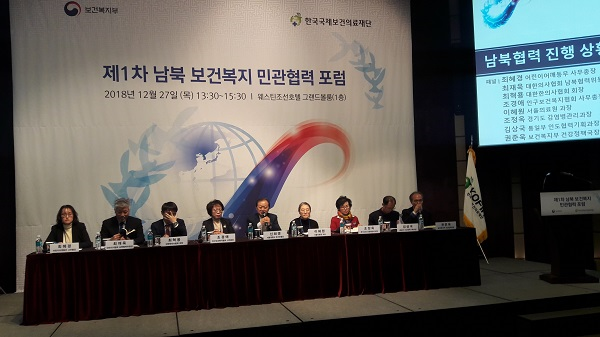The Korean medical community and Oriental medicine practitioners expressed different views on how to pursue inter-Korean healthcare cooperation.

While doctors argued that official development assistance (ODA) should be the key method, the Oriental medicine community said economic cooperation would be more beneficial to both Koreas.
The two sides revealed differences at “The First Inter-Korean Health and Welfare Public-Private Partnership Forum,” organized by the Ministry of Health and Welfare and the Korea Foundation for International Healthcare (KOFIH) at the Westin Chosun Seoul, Thursday.
At the forum, the Korean Medical Association (KMA)’s inter-Korean cooperation committee chief Choi Jae-wook said the two Koreas should do away with the old way of relying on the inter-Korean economic cooperation fund and private groups. Instead, the healthcare cooperation should Ibe based on ODA, he said.
“The inter-Korean healthcare cooperation is limited due to the strong sanctions against the North by the United Nations and the U.S.,” Choi said. “The North’s social and economic development, including the healthcare sector, will be feasible only with massive investment and long-term policy.”
Choi noted that before the two Koreas seek healthcare cooperation, they should first see the following happening -- eased international sanctions against the North, a diplomatic tie between the U.S. and North Korea, the North’s joining of the International Monetary Fund, the North’s bilateral and multilateral cooperation with foreign countries for development, and Pyongyang’s opening up the nation for foreign direct investment.
Choi pointed out that the biggest hurdle for the inter-Korean healthcare cooperation is the lack of principles and theories that can design and lead projects.
“Due to the North’s political and constitutional position, it cannot benefit from ODA. The past method of supports through inter-Korean economic cooperation fund and private groups does not seem to be sustainable anymore,” he said.
Attracting funds through ODA will be the only realistic measure for inter-Korean healthcare cooperation unless the North joins the World Bank to establish necessary infrastructure after being lifted from international sanctions followed by a complete denuclearization, Choi emphasized.
Choi proposed that the South utilizes its experience in ODA for development cooperation and take into account internationally standardized healthcare development goals and the North’s policy goals to establish a mid-term inter-Korean medical cooperation strategy for 2020-2025. Afterward, the two can come up with detailed implementation plans, he said.
On the other hand, the Oriental medicine community claimed that inter-Korean economic cooperation would be more practical and beneficial for the two Koreas.
Choi Hyuk-yong, president of the Association of Korean Medicine (AKM), said the KMA’s ODA projects led the past medical projects with the North.
“At that time, the South taught North Korean doctors, helped modernize hospital facilities, and donated medical devices and drugs,” Choi said. “On the surface, it was mutually beneficial cooperation. In reality, however, the South unilaterally gave the North everything and did not earn any in return.”
The Oriental medicine field, however, made efforts for economic cooperation, not ODA, he said.
“I was very impressed how North Korea uses Koryo Medicine. The South was eager to learn from them at that time,” Choi of the AKM said. He went on to say that bringing ginseng from Gaeseong in the North, which is known to be the world’s best, will benefit the South.
Currently, all herbs for Oriental medicine in the South are cultivated and distributed in small scale, according to Choi. “If the North produces herbs in large scale and bring them to the South, it can cause a revolution in the distribution of medicinal herbs,” he said.
Choi also noted that seeking a mere balanced regional development or superficial effects from healthcare cooperation will be insufficient to persuade South Korean people to support the inter-Korean healthcare cooperation. “We have to focus on what we can benefit from it and be able to persuade people with it,” he said.
For mutually beneficial cooperation and mutual respect, the two Koreas should discuss not only ODA but what the South can get and learn from the North in detail, Choi argued.
“Through such efforts, the South should address the national division over the North Korean issue,” he added.

